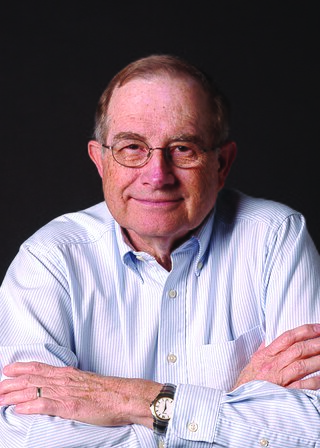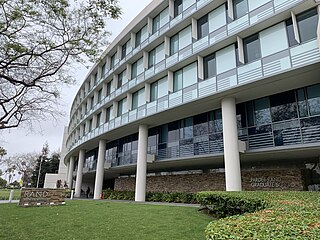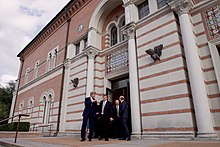
A think tank, or public policy institute, is a research institute that performs research and advocacy concerning topics such as social policy, political strategy, economics, military, technology, and culture. Most think tanks are non-governmental organizations, but some are semi-autonomous agencies within government, and some are associated with particular political parties, businesses or the military. Think tanks are often funded by individual donations, with many also accepting government grants.

The Claremont Graduate University (CGU) is a private, all-graduate research university in Claremont, California. Founded in 1925, CGU is a member of the Claremont Colleges consortium which includes five undergraduate and two graduate institutions of higher education.

Moscow State Institute of International Relations (MGIMO) is an institute of higher education located in Moscow, Russia. The institute is run by the Russian Ministry of Foreign Affairs.

Cornelius Francis "Neal" Lane, is an American physicist and senior fellow in science and technology policy at Rice University's Baker Institute for Public Policy and Malcolm Gillis University Professor Emeritus of Physics and Astronomy Emeritus at Rice University in Houston, Texas.
The Earth Institute is a research institute at Columbia University created in 1995 for addressing complex issues facing the planet and its inhabitants, with a focus on sustainable development. With an interdisciplinary approach, this includes research in climate change, geology, global health, economics, management, agriculture, ecosystems, urbanization, energy, hazards, and water. The Earth Institute's activities are guided by the idea that science and technological tools that already exist could be applied to greatly improve conditions for the world's poor, while preserving the natural systems that support life on Earth.

The Lyndon B. Johnson School of Public Affairs is a graduate school at the University of Texas at Austin that was founded in 1970. The school offers training in public policy analysis and administration in government and public affairs-related areas of the private and nonprofit sectors. Degree programs include a Master of Public Affairs (MPAff), a mid-career MPAff sequence, 16 MPAff dual degree programs, a Master of Global Policy Studies (MGPS), eight MGPS dual degree programs, an Executive Master of Public Leadership, and a Ph.D. in public policy.

The Frederick S. Pardee RAND Graduate School is a private graduate school associated with the RAND Corporation in Santa Monica, California. The school offers doctoral studies in policy analysis and practical experience working on RAND research projects to solve current public policy problems. Its campus is co-located with the RAND Corporation and most of the faculty is drawn from the 950 researchers at RAND.

The Baker School of Public Policy and Public Affairs is a nonpartisan institute on the campus of the University of Tennessee devoted to education and research concerning public policy and civic engagement. Through classes, public lectures, research, and student initiatives, the center aims to provide policy makers, citizens, scholars, and students with the information and skills necessary to work effectively within our political system and to serve our local, state, national, and global communities.
The Graduate School of Public and International Affairs (GSPIA) is one of 17 schools comprising the University of Pittsburgh. Founded in 1957 to study national and international public administration, GSPIA prides itself on its "Local to Global" distinction. As of 2018, it is one of only two policy schools with programs in the top 20 for both International Relations and City Management and Urban Policy. The former mayor of Pittsburgh, Bill Peduto, is a GSPIA alumnus.

The McCourt School of Public Policy is one of eleven constituent schools of Georgetown University in Washington, D.C. The McCourt School offers master's degrees in public policy, international development policy, policy management, data science for public policy, and policy leadership as well as administers several professional certificate programs and houses fifteen affiliated research centers. The McCourt School has twenty-one full-time faculty members, ten visiting faculty members, more than one-hundred adjunct faculty members and approximately 450 enrolled students across the various degree and executive education programs.
The SAIS Europe, located in Bologna, Italy, is the European campus of the School of Advanced International Studies (SAIS) under Johns Hopkins University. SAIS Europe's degree programs emphasize international economics, international relations, European Union policy, and global risk with options to specialize in a broad range of other policy areas and geographic regions.
The Andrew Young School of Policy Studies (AYSPS) is a school of public policy and one of 12 schools and colleges that constitute Georgia State University. Founded in 1996 as the Georgia State University Policy School, the school was named after civil rights leader Andrew Young in 1999.

Kirstin Matthews is a Fellow in Science and Technology Policy at the James A. Baker III Institute for Public Policy. Matthews received a bachelor's degree in biochemistry from the University of Texas at Austin and a PhD in molecular biology from the University of Texas Health Science Center. Matthews has published multiple policy recommendations pertaining to stem cell research, climate change, and health care.

İstanbul Kültür University (İKÜ) is one of the many private universities located in Istanbul, Turkey. It has a total of four campuses all in close proximity to each other in the western part of Istanbul. The three campuses are located in Şirinevler, İncirli, Basın Ekspres and Ataköy This non-profit University was founded in 1997; its Industrial Engineering started in the 1997–98 academic year. The university has five schools and two vocational schools. In 2009, Global Political Trends Center, a policy oriented research institution, was founded under the auspices of the university.
The Stanford US–Russia Forum (SURF) is an organization dedicated to bringing students at leading Russian and American universities together for research in public policy, business, economics and many other disciplines. The program begins with a fall conference in Russia, followed by six months of work on collaborative research projects and a capstone conference in the spring at Stanford University. Currently in its tenth year, more than 400 undergraduate, graduate, and professional school students from Russia and the U.S. have participated in the program.

Fundação Getulio Vargas is a Brazilian higher education institution and think tank founded on December 20, 1944.

The Balsillie School of International Affairs (BSIA) is a centre for advanced research and teaching on global governance and international public policy, located in Waterloo, Ontario. As one of the largest social sciences initiatives in Canada, the school is a collaborative partnership between the University of Waterloo, Wilfrid Laurier University, and the Centre for International Governance Innovation. The BSIA is an affiliate member of the Association of Professional Schools of International Affairs, a group of schools that educate leaders in international affairs. The BSIA is housed in the north and west wings of the CIGI Campus. Admission to BSIA is highly selective.

The King Abdullah Petroleum Studies and Research Center (KAPSARC) is an advisory organization specializing in energy economics, climate, and sustainability that seeks to advance Saudi Arabia’s energy sector and inform global policies through evidence-based advice and applied research. It is located in Riyadh, Saudi Arabia.

The School of Public Policy is a Canadian government-funded think tank based at the University of Calgary located in Calgary, Alberta, Canada.
The Arctic Institute – Center for Circumpolar Security Studies, often referred to as The Arctic Institute or TAI, is an international think tank founded in 2011 and headquartered in Washington, D.C. The Institute's mission is to inform Arctic policy through interdisciplinary, inclusive research that addresses the most critical issues in the circumpolar Arctic. TAI is composed of researchers from around the world. The University of Pennsylvania's Global Go To Think Tank Index has consistently ranked The Arctic Institute among the top one hundred best think tanks in the United States since 2016. Romain Chuffart has served as Managing Director since September 2022.















